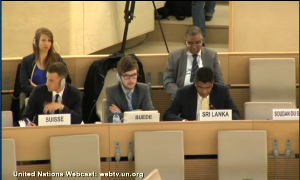Sri Lanka intervening during the 25th Session of the Human Rights Council under Agenda Item 3: Clustered ID with the Special Rapporteur on Freedom of Religion or Belief and the Special Rapporteur on Counter – Terrorism on 12th March 2014, said the recent sporadic attacks on religious targets are isolated incidents and there is an attempt to portray such sporadic incidents targeting places of worship as a sign of religious hatred and intolerance.
In a statement at this interactive dialogue with the Special Rapporteur on Freedom of Religion or Belief, the Sri Lankan delegation said that the Government does not condone such attacks on places of religious worship.
In all instances where police complaints have been lodged, the legal process has been set in motion, including producing suspects before magistrates, the statement said.
While noting that Sri Lanka is a multi-ethnic and multi-religious country, the statement said Sri Lanka Government is committed to protecting and ensuring the rights of all people in Sri Lanka to enjoy freedom of religion including the freedom to have or adopt a religion or belief of their choice.
The statement said that in keeping with Sri Lanka’s social, cultural and historical norms, regular dialogue continues to take place at various levels to ensure interfaith harmony and understanding among its diverse populace.
full statement
Statement by the Democratic Socialist Republic of Sri Lanka 25th Session of the Human Rights Council
Agenda Item 3 : Clustered ID with the SR on Freedom of Religion or Belief and the SR on Counter-Terrorism
Mr. President,
My delegation thanks the Special Rapporteur on the promotion and protection of human rights and fundamental freedoms while countering terrorism, Mr. Ben Emmerson, for his Report A/HRC/25/29, and notes the recommendations.
The Special Rapporteur in his Report examines the use of remotely piloted aircraft, or drones, in extraterritorial lethal counter-terrorism operations, including in the context of asymmetrical armed conflict, and examines the allegations that the increasing use of these weapons, has caused a disproportionate number of civilian casualties. We welcome in this regard initiatives to discuss the subject of the use of armed drones in counter-terrorism and military operations in accordance with international law in the Council.
Mr. President,
As a country that suffered immensely under the scourge of terrorism, for nearly three decades, we in Sri Lanka are acutely conscious of the human and economic costs of terrorism, and condemns it in all its manifestations. Sri Lanka eradicated terrorism almost five years ago, and is today in the process of consolidating peace and reconciliation amongst its people. Terrorism, wherever in the world, in whatever form, is a threat to the collective security of all nations. Countries therefore need to abide by the UN Charter in undertaking counter-terrorism measures, including in the use of armed drones, in respect of the sovereignty and territorial integrity of all states.
Mr. President,
Sri Lanka also thanks the Special Rapporteur on Freedom of Religion or Belief Mr. Heiner Bielefeldt for his Report A/HRC/ A/HRC/25/58 on the question of how States and other stakeholders can appropriately tackle manifestations of collective religious hatred.
Sri Lanka agrees with the Special Rapporteur that policies intended to counter manifestations of religious hatred must invest in ‘trust-building’ based on universal respect.
We observe that Sri Lanka is home to a multi–ethnic, multi–religious community including those of the Buddhist, Hindu, Christian and Islamic faiths, where the people belonging to these four major religions have co-existed harmoniously for centuries. All people living in Sri Lanka enjoy freedom of religion including the freedom to have or to adopt a religion or belief of their choice, which is a constitutionally guaranteed entrenched right. The Government of Sri Lanka remains committed to ensuring that this right is protected.
Mr. President,
Regrettably, there is an attempt to portray recent sporadic incidents targeting religious places of worship of all four religions, as a sign of religious hatred and intolerance. The Government does not condone such action. In all instances where police complaints have been lodged, the legal process has been set in motion, including producing suspects before Magistrates.
In addition to the provisions of the Penal Code, the ICCPR Act No. 56 of 2007 criminalises advocating religious hatred that constitutes incitement to discrimination, hostility or violence.
More broadly, in keeping with Sri Lanka’s societal, cultural and historical norms, regular dialogue continues to take place at various levels to ensure interfaith harmony and understanding amongst its diverse populace.
In conclusion Sri Lanka reiterates its commitment to working closely with the two Special Rapporteurs in executing their respective mandates.
I thank you.


Leave a comment